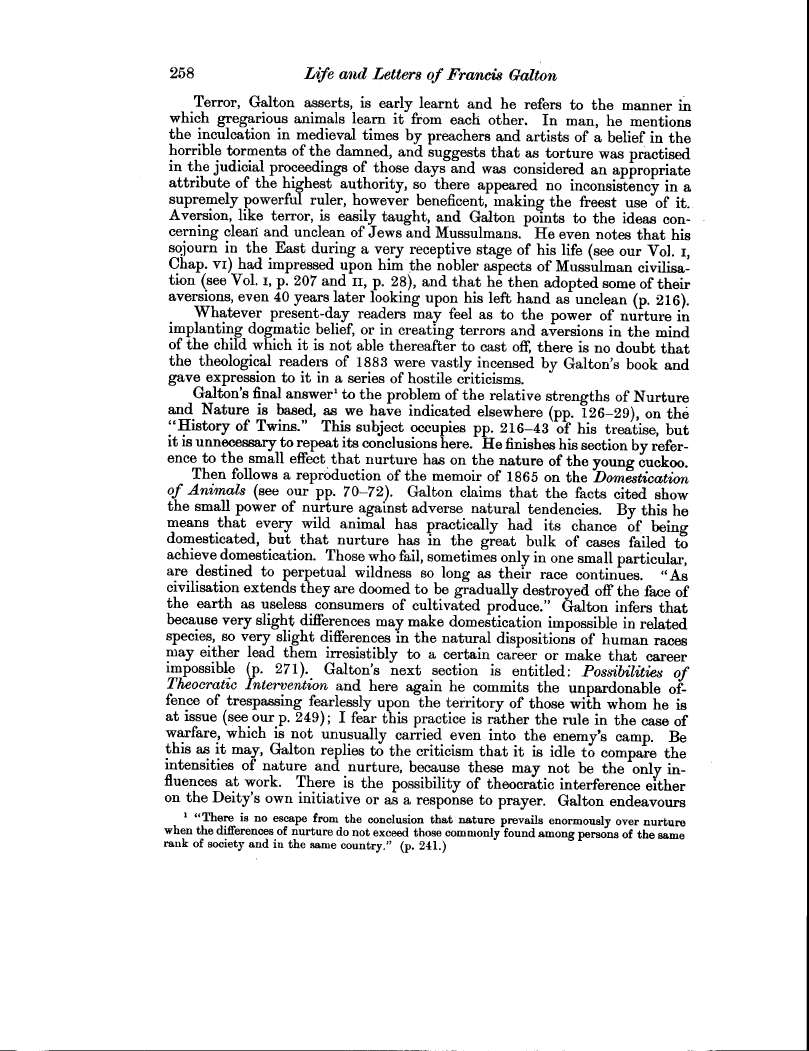258 Life and Letters of Francis Galton
Terror, Galton asserts, is early learnt and he refers to the manner in which gregarious animals learn it from each other. In man, he mentions the inculcation in medieval times by preachers and artists of a belief in the horrible torments of the damned, and suggests that as torture was practised in the judicial proceedings of those days and was considered an appropriate attribute of the highest authority, so there appeared no inconsistency in a supremely powerful ruler, however beneficent, making the freest use of it. Aversion, like terror, is easily taught, and Galton points to the ideas concerning clean and unclean of Jews and Mussulmans. He even notes that his sojourn in the East during a very receptive stage of his life (see our Vol. i, Chap. vi) had impressed upon him the nobler aspects of Mussulman civilisation (see Vol. i, p. 207 and ii, p. 28), and that he then adopted some of their aversions, even 40 years later looking upon his left hand as unclean (p. 216).
Whatever present-day readers may feel as to the power of nurture in implanting dogmatic belief, or in creating terrors and aversions in the mind of the child which it is not able thereafter to cast off, there is no doubt that the theological readers of 1883 were vastly incensed by Galton's book and gave expression to it in a series of hostile criticisms.
Galton's final answer" to the problem of the relative strengths of Nurture and Nature is based, as we have indicated elsewhere (pp. 126-29), on the "History of Twins." This subject occupies pp. 216-43 of his treatise, but it is unnecessary to repeat its conclusions here. He finishes his section by reference to the small effect that nurture has on the nature of the young cuckoo.
Then follows a reproduction of the memoir of 1865 on the Domestication of Animals (see our pp. 70-72). Galton claims that the facts cited show the small power of nurture against adverse natural tendencies. By this he means that every wild animal has practically had its chance of being domesticated, but that nurture has in the great bulk of cases failed to achieve domestication. Those who fail, sometimes only in one small particular, are destined to perpetual wildness so long as their race continues. "As civilisation extends they are doomed to be gradually destroyed off the face of the earth as useless consumers of cultivated produce." Galton infers that because very slight differences may make domestication impossible in related species, so very slight differences in the natural dispositions of human races may either lead them irresistibly to a certain career or make that career impossible (p. 271). Galton's next section is entitled: Possibilities of Theocratic Intervention and here again he commits the unpardonable offence of trespassing fearlessly upon the territory of those with whom he is at issue (see our p. 249); I fear this practice is rather the rule in the case of warfare, which is not unusually carried even into the enemy's camp. Be this as it may, Galton replies to the criticism that it is idle to compare the intensities of nature and nurture, because these may not be the only influences at work. There is the possibility of theocratic interference either on the Deity's own initiative or as a response to prayer. Galton endeavours
" "There is no escape from the conclusion that nature prevails enormously over nurture when the differences of nurture do not exceed those commonly found among persons of the same rank of society and in the same country." (p. 241.)

